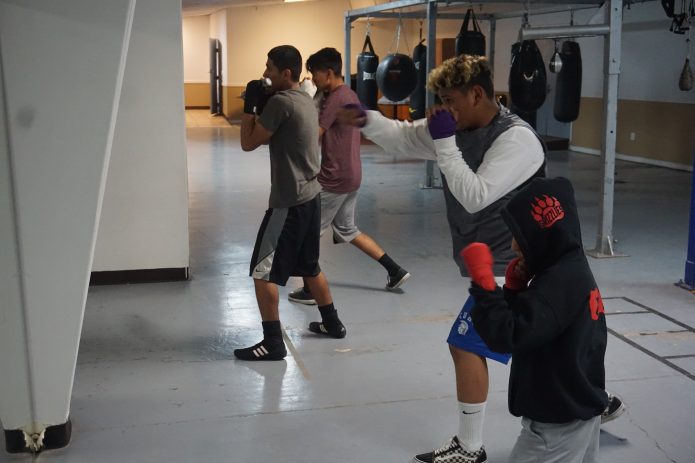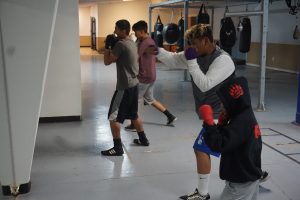
Youth take part in a boxing class organized by the El Centro Police Activities League, which for 24 years has been providing programs for youth, not only from El Centro but the entire Imperial Valley.
Antonio Cornejo and his younger brother Esteban grew up in El Centro. As teens, they found their way to the Police Activities League as a way to get involved in sports they may not have had access to without the program. Back in 2003, the two teenage brothers found their focus in PAL martial arts classes. “We were born and raised here and grew up in humble beginnings,” said Antonio, who is now 32 years old. “This was the place where we could come, and it turned out to be the best thing for us.”
The Cornejo brothers point to the importance of the El Centro PAL, which for 24 years has been providing programs that keep kids off the streets. The PAL programs focus on reaching out to youth and providing them a chance to participate in affordable programs they might not otherwise have a chance to experience. While most activities center around athletics, the reach of PAL far exceeds just sports, providing the youth a chance to travel, learn the importance of education, especially through field trips to universities, and provides mentors—adults who volunteer their time to make sure the kids see there are those in the community, beyond their families, who care about their futures.
Today, the two brothers are now the martial arts teachers in the El Centro PAL, volunteering their time each day to give back to the program that meant so much to them. “It means the world to me,” Esteban, who is 28, said. “Those feelings I felt when I accomplished a goal…just to now see that same sense of accomplishment in these kids’ faces is just my way of giving back.” Antonio added: “Parents come and tell us how this program has made a difference for their kids. To me, that’s the reward.”
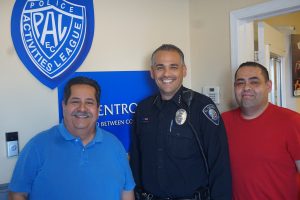
Pictured are (from left to right) Edward Preciado, executive director for the El Centro PAL, Alvaro Ramirez, Interim Police Chief of the El Centro Police Department, and Tony Gutierrez, PAL staff and catering director for the PAL Center.
“It is a way to offer kids good, healthy, positive role models,” said El Centro Police Department Interim Chief Alvaro Ramirez. “It is such a diverse program that offers so much to kids.” The El Centro Police Activities League began in 1994 and was the first PAL program in the Imperial Valley. It began locally as an offshoot of a greater focus on what those in law enforcement call community oriented policing—a proactive way of having officers interact and engage in the community to build positive relationships.
When the El Centro PAL began, it operated out of a department substation in a city apartment, and the program first offered youth soccer after school. Back then, some 200 children participated. But PAL quickly grew as word spread. Eventually, an old building once used for bowling was donated to PAL on Fourth Street near Swarthout Park and today continues to serve as the base for the El Centro PAL’s programming. Youth can participate in a co-ed soccer league, boxing, martial arts, archery and golfing. A computer lab and tutoring is also available. Today, the El Centro PAL serves the entire Valley with nearly 2,000 kids from 4 to 17 years of age participate in the sporting activities offered each day.
Additional youth participate in two other PALs in the Valley—the Sheriff’s Activities League and the Calipatria PAL. Edward Preciado, a retired sergeant from the Imperial County Sheriff’s Office, who established the Sheriff’s Activities League, serves as executive director of the El Centro PAL.
“I’ve always been a firm believer in giving back the community, and that is exactly what PAL does,” Preciado said, adding that from his time with the Sheriff’s program and now with the El Centro PAL, he has seen the positive influence on youth who have grown up, become productive members of the community and now support PAL by volunteering their time.
Teresa Ortiz, of El Centro, enrolled her two sons, Adrian, 6, and Jayde, 12, in the PAL martial arts program. She said, “This is a great program. I probably wouldn’t be able to afford classes for both of them if it wasn’t for PAL.”
The most popular PAL program is its soccer league. Pablo Nava is one of the PAL coaches who started a PAL travel team, where kids from the Valley travel to other areas to play in tournaments. This month, he and his team will travel to a tournament in Oxnard.
“By traveling the kids see what’s out there, and they learn that the things they wish for—the things they want to do—they have to go to school to accomplish,” Nava said.
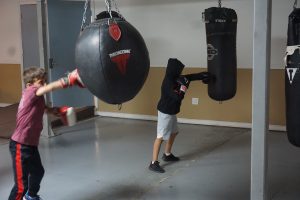
Two young boxers practice their skills at the PAL Center in El Centro.
For the youth in the programs, the wider goals of the PAL—providing positive role models and chances to enjoy activities and experiences that otherwise might not be available—is not something they contemplate. They just know PAL is there for them each day after school, providing some fun and a chance to be with friends.
Ten-year-old Cristian Garcia, who is 10, and lives in Heber, takes part in the boxing program. “I like training hard,” he said. “It’s fun to shadow box.”
Twelve-year-old Emilia Conchola of Imperial, who also boxes, said, “it’s fun to exercise, and this gives me something to do after school.”
Juan Garcia, 20, of El Centro, has been coming to PAL to train in boxing for two years and now serves as an assistant coach. PAL has given him a chance to not only train, but test his skills in amateur boxing matches in areas outside the Imperial Valley, and now he is ready to try a professional boxing career. “I love this sport, and PAL makes it possible to train.”
Though the El Centro PAL was once directly connected to the Police Department, these days it operates independently, though still with support of the department. Nevertheless, with independence comes the challenge of maintain funding for the programs, and that’s where Preciado, as executive director, really plays a major role.
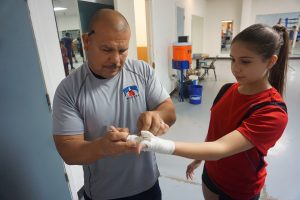
PAL boxing coach and Imperial Police Officer Hector Lizarraga, who is also a former professional boxer, places tape over the hands of Emilia Conchola, 12, of Imperial, as she prepares to box at the El Centro PAL.
He and his staff work tirelessly to seek donations from the community so that PAL can continue to serve as many youth as possible. They have also opened PAL’s doors to special events and service club meetings to help raise funds.”
“We’ve been blessed because people believe in the programs we do,” Preciado said. “But it is a constant fund-raising effort.
He thanked those agencies and organizations that have donated funding support, and he also thanked those coaches who volunteer and other volunteers who help the kids and serve PAL.
Tony Gutierrez, a PAL staff member catering director for events held at the PAL building, added: “It is the community that keeps us alive.”
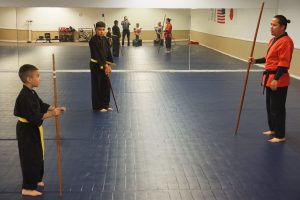
EL Centro PAL Martial Arts instructor Esteban Cornejo works with two of his students at the PAL Center.
Preciado pointed out that the goal is to expand PAL’s programming, but he can only do that with more volunteer support. He invited anyone interested in starting a new program at PAL for kids—anyone willing to give their time to make a new program a success—is welcome to reach out to him at his office on Fourth Street.
“We welcome those people,” he said. “Their help would be so appreciated, and I know it means a lot to these kids.”
